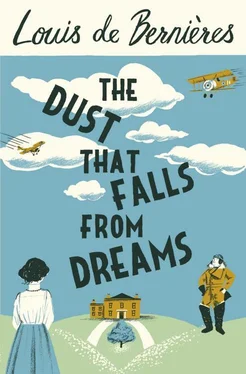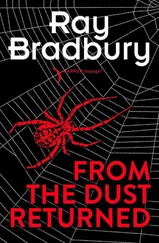When she was not tending to Daniel, Rosie went downstairs and helped Mrs Burke. She was an irredeemable tittlemouse, and everything needed to be repeatedly scrubbed, dusted and inspected. Mrs Burke showed Rosie how to make colcannon, and they fried up a great many sausages and slices of liver, creating overflowing white jugs of dark gravy with which to drench them.
Quite often they talked about Ireland. Rosie said she had never been, and Mrs Burke observed, ‘You’d better be going soon, before we’re all long gone.’ She told Rosie that the reason she was in England was that she had ‘married a feckin’ Proddy dog, and the fecker died, and now I can’t go feckin’ home’. They talked about St Brigid and religion in general, and about the last Pope who was a saint, and many times they set the world to rights. They drank stupendous quantities of thick tea made with condensed milk, and Mrs Burke poured some whiskey in Rosie’s tea, just for the craic. Rosie thought how sad it was that her mother would never invite someone like Mrs Burke to stay, and wondered briefly what it would be like to have the nice little house in Wootton Wawen, so that she might see the entertaining and convivial Mrs Burke again.
Rosie had lost her snobbery at Netley, and after tending so many soldiers in agony, had become completely immune to picturesque speech. She loved being with Mrs Burke, and realised that she was going to miss her, when, on the ninth day, Daniel’s temperature broke and his fever subsided.
A week later, with Daniel wrapped up in an eiderdown and looking very like the Michelin Man, they were delivered home to Eltham in the Bentley.
Here Daniel, who had been pining for a cigarette, lit one up, inhaled deeply, and doubled over and choked. He was so disgusted that he threw the thing in the fire and ran to wash out his mouth with Listerine. ‘Never a-bloody-gain,’ he declared. ‘That is absolutely bloody vile. Why the hell did I ever take it up, for God’s sake?’
Rosie thought, ‘Ash didn’t smoke, and now Daniel doesn’t.’
Daniel was weak for a long time, and felt terribly cold at night, so Rosie climbed in beside him, and spooned him for warmth. They had grown closer on account of the crisis. He bought her a silver necklace with an amethyst in it, for saving his life. She often questioned herself as to why everyone else loved and esteemed him so much better than she did. She was beginning to understand that it is not enough to love someone deeply; you also have to learn to love them well.
91. Millicent’s Interview
‘A POLICEMAN!’ EXCLAIMED Mrs McCosh. ‘A policeman!’
‘Yes, madam,’ said Millicent. ‘You do know him. I mean, he’s been here before. He’s the one what arrested that man what killed the little boy with the AC.’
‘I think I do remember him,’ said Mrs McCosh. ‘A big strong fellow.’
‘Well, anyway, that’s him,’ said Millicent.
‘You do realise that you will have to move out of this house, don’t you? I can’t have a policeman here at night. This is a respectable family house. One can’t possibly have marital relations going on in it.’
‘No, madam. But it’s all right, he’s a local bobby, and he’s got nice lodgings, and his landlady says it’s all right with her, until I actually start having kids, madam, and then we’ll have to look elsewhere, because the landlady doesn’t hold with kids. Nor Irish, neither.’
‘You are most unlikely to have Irish children,’ observed Mrs McCosh. ‘Of course, one would normally expect you to leave upon getting married, but I am prepared to let you stay on until such time as you have children, if you wish. You’re a very valuable servant to us, you know, Millicent, and it would certainly be hard to replace you. When you do have children, however, you clearly wouldn’t be able to work here any more. You’d have to look after the child, would you not? And no respectable house that I know of has a maid with children.’
‘No, madam. Unless there’s a granny to palm them off on.’
‘Well,’ said Mrs McCosh graciously, ‘I do wish you and your policeman every possible happiness. You will of course have to endure a great deal of degradation and humiliation, but I always think it worth it for the children that result, and if one holds out long enough, one’s husband does eventually give up.’
‘Yes, madam, thank you, madam.’
The following day, Christabel announced that she and Gaskell were taking lodgings together in Chelsea.
‘But my dear!’ Mrs McCosh had exclaimed. ‘Two young women on their own? In such a very poor and run-down place? Who will have regard to your virtue?’
‘We will watch each other like hawks,’ said Christabel, ‘and Gaskell does have a pair of Purdeys.’
DANIEL HAD GONE to Cambridge on the train, and had found himself sitting in the same second-class carriage as someone who looked very familiar. They had for some time been sitting, studiously oblivious to each other as the British still are on public transport. The dapper gentleman was reading a book with the intriguing title Principia Ethica and Daniel was reading Every Man his Own Mechanic . The other occupant was thin and bird-like, but he sported a fairly impressive moustache.
Daniel noticed that the gentleman was struggling to light matches in order to rekindle his pipe, and Daniel reached into his pocket to offer his petrol lighter, which he still carried with him despite having renounced tobacco, because lighting other people’s cigarettes was so much an embedded part of modern social ritual. ‘Thank you so much,’ said the dapper gentleman, in a voice that was exceedingly clipped and aristocratic, and before very long the two had fallen into conversation.
‘I see you have most practical reading matter,’ said the gentleman. ‘It must be very interesting.’
‘It is,’ replied Daniel. ‘It deals with just about everything that one could want to do. I’m learning how to harden blades for different purposes. Yours looks intimidating, if I may say so. Is it in Latin? I wasn’t very good at it at Westminster.’
‘You shouldn’t be deceived by that,’ said the stranger. ‘It’s written in very clear English, as a matter of fact. Do they still teach Latin in a very peculiar accent at Westminster?’
‘They certainly did when I was there.’
‘You can always tell an old boy from the peculiar accent. I was educated by a tutor, which may or may not have been a good thing. Which house were you in?’
‘Rigaud’s. It was remarkable solely for the thrashings and its appalling latrines. Worse than anything I saw in France. So … your book?’
‘Written by a friend, 1903. I’ve read it hundreds of times, just to make sure, but I still can’t approve of it. He’s a charming man, however, a very beautiful and innocent spirit, an Apostle, if that means anything to you. I expect to see him when I get to Cambridge.’
‘So … are you a don? At Cambridge.’
‘I am a logician, mathematican and philosopher,’ said the gentleman grandly, ‘and I used to be a don, but I was turfed out, not least by my own friends. I am, I feel compelled, almost sorry to say, a pacifist. It didn’t go down well. In fact you will probably not wish to speak to me.’
‘I was in the Royal Flying Corps, and then the Royal Air Force,’ said Daniel, somewhat stiffly. ‘However, I am aware of the arguments. And I can assure you that just about all of us frequently wondered if it was all worth it. We didn’t doubt the cause, I don’t mean that for a minute. I mean we doubted whether the cause was worth all that damage. We suffered much exhaustion and despair, and I was often physically sick after I shot someone down, particularly if they went down in flames. In my case it was def-initely worth it because I am half French, and I had a motherland to liberate. If I had been entirely British I think I would have had far greater doubts. Are you, by any chance, Bertrand Russell?’
Читать дальше












